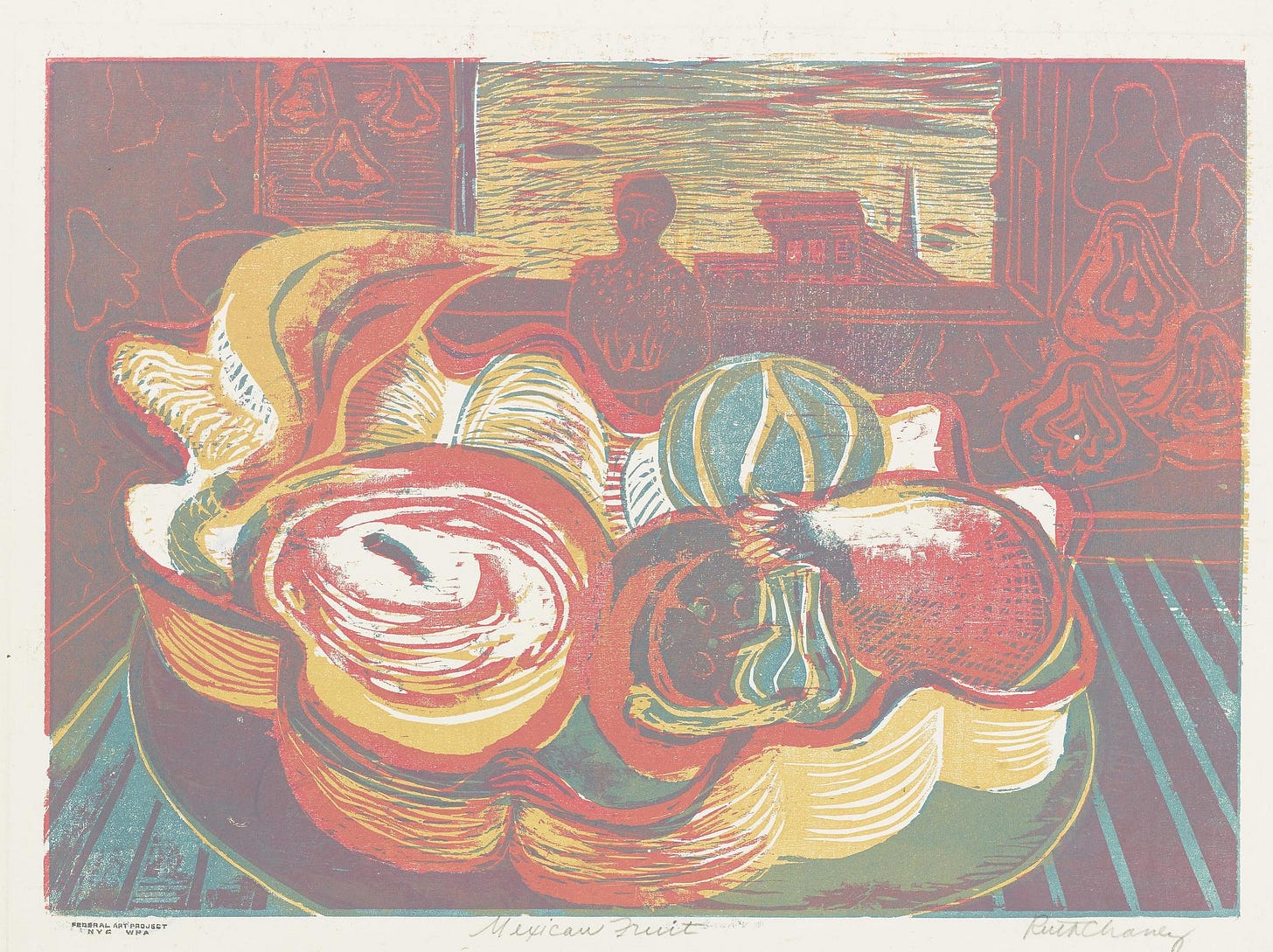June Book Report
Some Library Discoveries

Hello! I find out about books when I find out about them, usually that’s later than other people. It took the majority of my 20s to even start to figure out my taste (with the help of much more knowledgeable friends), so these past couple years have felt like a wealth of belated and wonderful discovery for me. A good chunk of the time, I’ll first hear of an author I then come to love if they won a major award (Annie Ernaux), were suggested for the book club I’m in (Penelope Fitzgerald), or died (Javier Marías).
Obviously now my job (librarian) has become a major part of this. By my count there have been about 33 “library discoveries” as I think of them in the past year and a half since I started working full time (and keeping track). Some are anticipatory: books I see on the “coming soon” spreadsheet sent out by our collections development department and plan to put a hold on (Vengeance is Mine by Marie NDiaye), some are books I come across in research for compiling orders (The Elusive Moth by Ingrid Winterbach), and others are ones that I encounter in the wild (The Obscene Bird of Night by José Donoso). I’ve mostly tried to keep this list to books in the last category, the ones I had no prior knowledge of and spotted on my branch’s shelves, charts, return bins or in the batches of new books to be processed, and simply had to check out.
The Housing Lark by Sam Selvon
Look, I will keep banging on about this book until everyone I know reads it. A very funny ode to the beauty and pitfalls of cooking up schemes with your friends, a snapshot of the shaky hope of the Windrush era in London, and proof that as far as housing goes, the more things that are fucked up change, the more they stay the same. Thank god for my old branch’s Classics section.
The Possessed by Witold Gombrowicz (t. Antonia LLoyd-Jones)
I’ll be honest I finished this about 3 hours ago, but I had spotted it in a batch of new books about to be shelved, the unfamiliar name Gombrowicz caught my eye, and I’m a sucker for Central/Eastern European translations. I don’t know if I would describe it as “great,” but I certainly had a fun time reading it. It’s a madcap gothic spoof with teeth: you’ve got a sinister castle, a mad prince hoarding treasure, a haunted towel, sadomasochist power plays, and two love interests who inexplicably elicit murderous instincts in each other.
The book’s linage as a serial [that was never fully released because the Nazis invaded Poland before the last installments were published] shows through in its tendency towards pulpy sensationalism and forays away from the main conflict into tennis matches and the rotting upper-crust of Warsaw society [also a character’s name changes a third of the way in because someone complained about a supposed similarity]. I immediately clocked these devices to lengthen the work and heighten suspense, but I was impressed by how well Gombrowicz pulled them off! I think this is owed to his talent at capturing movement: the tennis matches, ball scenes and even a car chase really grabbed me in a way most movement-centric passages in books don’t. He was able to convey the feeling of being swept up in the music on a dance floor, with your dance partner better than most historical romance writers, and I was more riveted reading the tennis passages in this book than I was watching Challengers.
While the young lovers are running around Warsaw, the power struggle happening back at the castle between the prince, his secretary, his butler, and an art historian trying the catalog all the priceless possessions was maybe the most enjoyable part of the book for me. There’s talk of “quivering” and vying for the prince’s affection and secret passageways and mind games and it’s just immensely entertaining. And spooky! Gombrowicz really managed to capture the uncanny dread and darkness in the castle that seeps into the characters. A wild ride!
Evil Flowers: Stories by Gunnhild Øyehaug (t. Kari Dickson)
A really delightful collection I found while pulling holds from the fiction shelves. These brief, weird stories reminded me of Diane Williams, with a lot of non sequiturs and a skewed sense of reality. Some stories are just a few paragraphs rebutting the previous story, one starts with a piece of a woman’s brain falling out of her vagina. Øyehaug has got to be the most playful Norwegian writer I’ve encountered thus far.

Oblomov by Ivan Goncharov (t. David Magarshack)
I plucked this from a particularly full Monday return bin, because I realized a) I hadn’t read a (translated) Russian author in a long time and b) it was probably an even longer time since I read a 19th century novel. This is pretty famous for its main character’s absolute refusal to do anything productive, but considering that what he’s avoiding is actually being a better landlord, we must say “and that’s valid.”
But all 21st century political viewpoints aside, there is an endearing earnestness to Oblomov, and a pathos in his failure to rise to his love interest Olga’s expectations of him, despite wanting to. In the time since finishing it, the scenes between Olga, Oblomov and his industrious German (surprise) friend Stoltz have stuck with me the most. It’s heartbreaking watching this love triangle learn that no matter how much you want to fight it, the building of intimacy necessitates the shedding of illusions, and so has as much chance as breaking a relationship as strengthening it.
The Wounded Age and Eastern Tales by Ferit Edgü (t. Aron Aji)
A returns-to-be-shelved cart find. The first book in this volume, The Wounded Age, is structured like poetry and recounts the travels of a journalist reporting on Kurdish refugees fleeing Turkish aggression in the eastern part of the country. The brief snippets of testimony are quite haunting, and it was impossible for me not to think of accounts of displaced Palestinians trying to find safety amid Israel’s assault on Gaza.
The second book Eastern Tales continues to probe the history of the region with more traditionally-structured short stories, and I was particularly taken with “The Story of Ibram, Son of Ibram.” I think my library couldn’t decide where to shelve it, and split the difference by assigning it the Dewey Decimal number in the 800s for Turkish translated fiction. Technically all fiction can be assigned a Dewey Decimal number, with each decimal representing a genre and/or language, but since it would stupid to do that with the amount of fiction libraries carry, it’s shelved separately and alphabetically. However, sometimes translated works slip though and get shelved after poetry, which is all the more reason to keep the 800s in mind while you’re browsing.
Poetry
Speaking of the 800s! I have no idea how to talk about poetry other than “I like that” or “this felt kind of corny” or “that was pretty sexy let me take a picture of that.” I have friends who know poetry and have never steered me wrong with recommendations before, so I usually defer to them. But I have really enjoyed stuff that caught my eye on the shelves! Listed below in no particular order:
-Air Pocket by Kimiko Hahn
-or, on being the other woman by Simone White
-Boat by Lisa Robertson
-Lapis by Kerri Webster
-Ascent of the Mothers by Noelle Kocot
-Say/mirror by JP Howard
-Ladder Music by Ellen Doré Watson
-Ex-Voto by Adélia Prado (t. Ellen Doré Watson)

I think the point of all this is to just encourage the use of public libraries, as corny as it may be for me to act as champion of a very flawed institution and my employer. But please please please go to programing at your local public library, and advocate for library funding, especially if you are in New York, where we are currently in another cycle of groveling and begging the mayor to let us stay open on Saturdays and fully staff our branches. But while you’re there, browse the shelves.
Thanks for reading, see ya later!


I just picked up Evil Flowers from the hold shelf today (thank you again for the rec)! I've bounced from theory (The Poetics of Space) to fiction (Go, Went, Gone) and now to non-fiction (Impermanence) without finishing those first two, so having something in the queue that's 120 pages and snappy makes me think that I'll *actually* finish what I start